Essay on Emotional Intelligence PDF 2022
VerifiedAdded on 2022/10/06
|6
|1565
|28
Essay
AI Summary
Contribute Materials
Your contribution can guide someone’s learning journey. Share your
documents today.
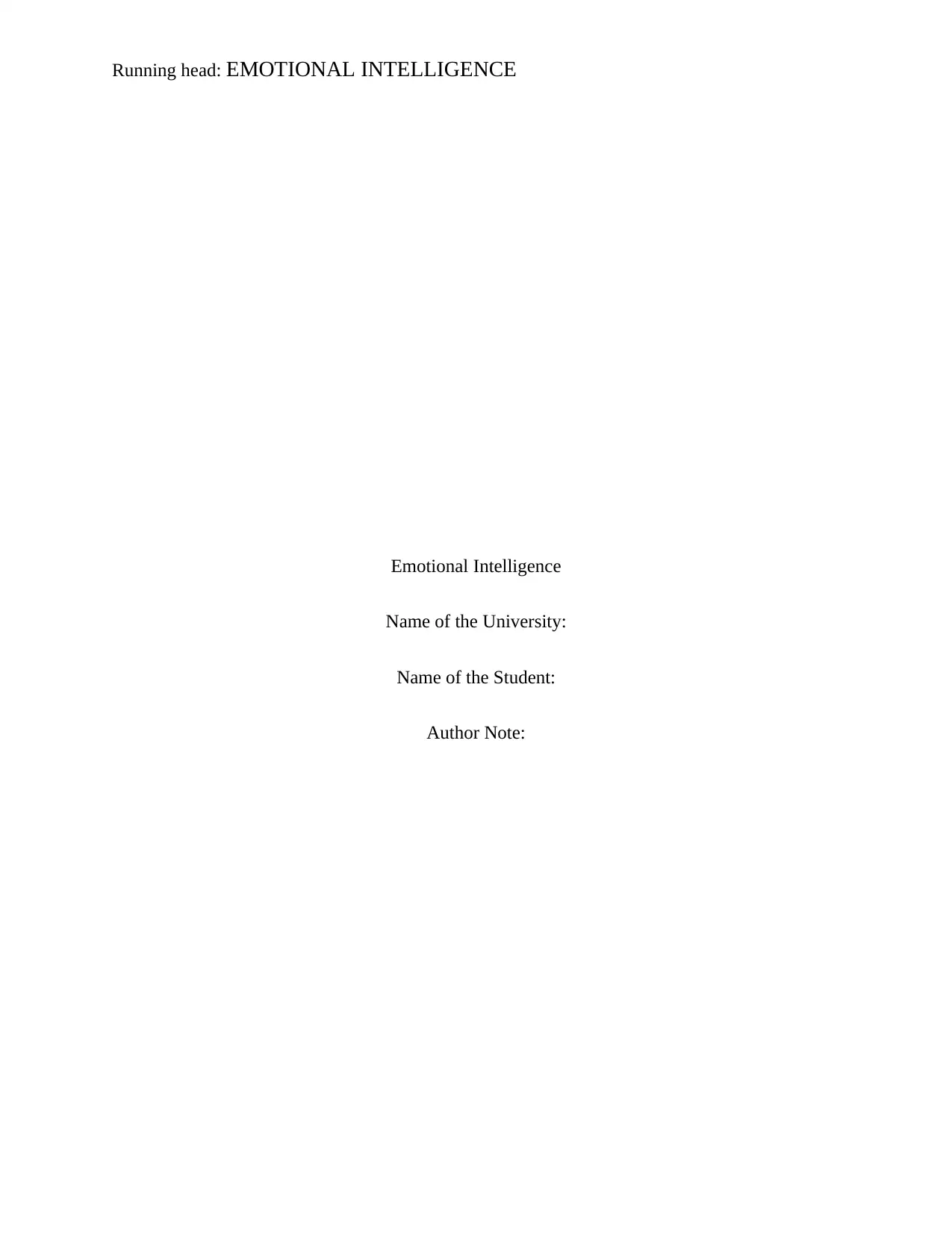
Running head: EMOTIONAL INTELLIGENCE
Emotional Intelligence
Name of the University:
Name of the Student:
Author Note:
Emotional Intelligence
Name of the University:
Name of the Student:
Author Note:
Secure Best Marks with AI Grader
Need help grading? Try our AI Grader for instant feedback on your assignments.
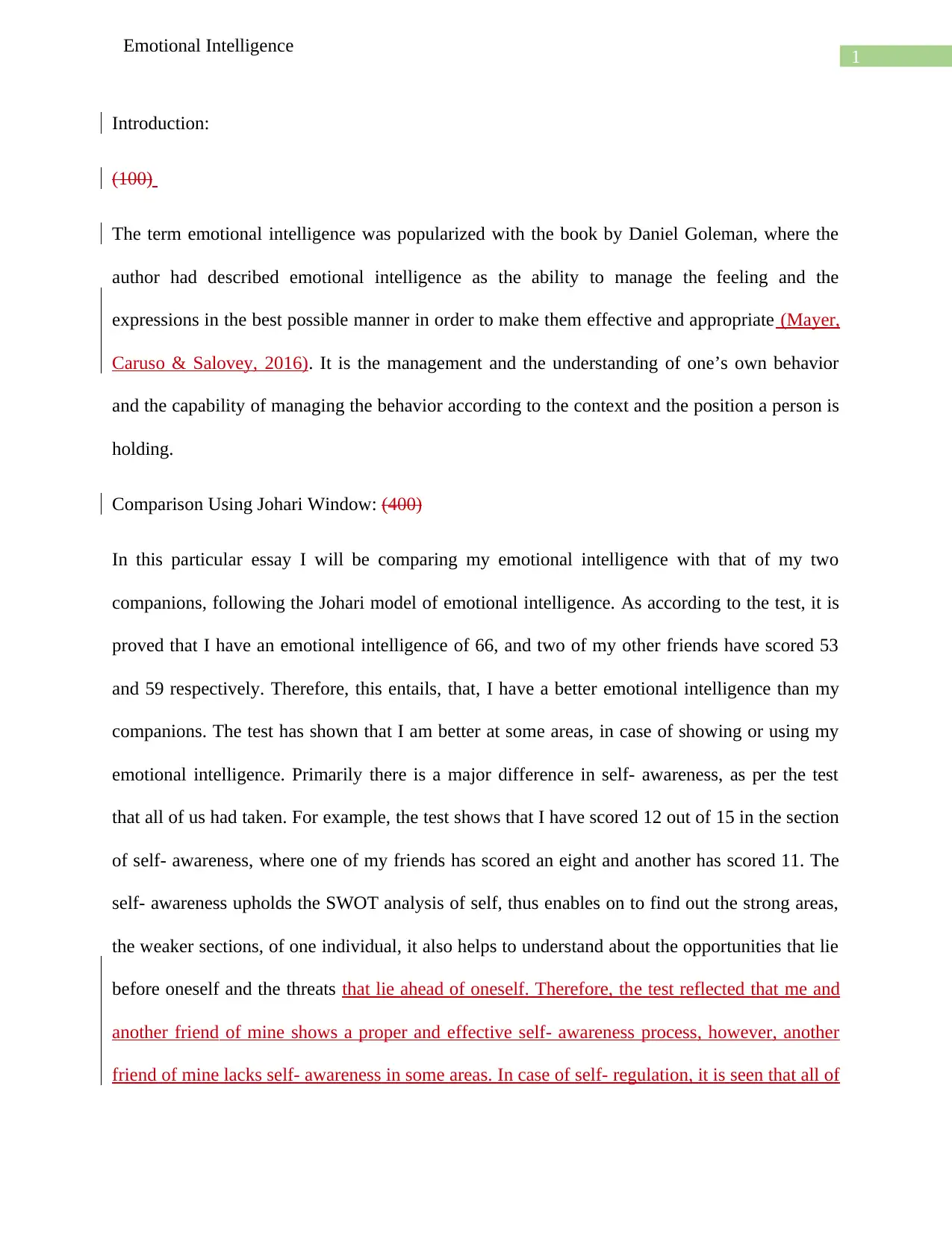
1
Emotional Intelligence
Introduction:
(100)
The term emotional intelligence was popularized with the book by Daniel Goleman, where the
author had described emotional intelligence as the ability to manage the feeling and the
expressions in the best possible manner in order to make them effective and appropriate (Mayer,
Caruso & Salovey, 2016). It is the management and the understanding of one’s own behavior
and the capability of managing the behavior according to the context and the position a person is
holding.
Comparison Using Johari Window: (400)
In this particular essay I will be comparing my emotional intelligence with that of my two
companions, following the Johari model of emotional intelligence. As according to the test, it is
proved that I have an emotional intelligence of 66, and two of my other friends have scored 53
and 59 respectively. Therefore, this entails, that, I have a better emotional intelligence than my
companions. The test has shown that I am better at some areas, in case of showing or using my
emotional intelligence. Primarily there is a major difference in self- awareness, as per the test
that all of us had taken. For example, the test shows that I have scored 12 out of 15 in the section
of self- awareness, where one of my friends has scored an eight and another has scored 11. The
self- awareness upholds the SWOT analysis of self, thus enables on to find out the strong areas,
the weaker sections, of one individual, it also helps to understand about the opportunities that lie
before oneself and the threats that lie ahead of oneself. Therefore, the test reflected that me and
another friend of mine shows a proper and effective self- awareness process, however, another
friend of mine lacks self- awareness in some areas. In case of self- regulation, it is seen that all of
Emotional Intelligence
Introduction:
(100)
The term emotional intelligence was popularized with the book by Daniel Goleman, where the
author had described emotional intelligence as the ability to manage the feeling and the
expressions in the best possible manner in order to make them effective and appropriate (Mayer,
Caruso & Salovey, 2016). It is the management and the understanding of one’s own behavior
and the capability of managing the behavior according to the context and the position a person is
holding.
Comparison Using Johari Window: (400)
In this particular essay I will be comparing my emotional intelligence with that of my two
companions, following the Johari model of emotional intelligence. As according to the test, it is
proved that I have an emotional intelligence of 66, and two of my other friends have scored 53
and 59 respectively. Therefore, this entails, that, I have a better emotional intelligence than my
companions. The test has shown that I am better at some areas, in case of showing or using my
emotional intelligence. Primarily there is a major difference in self- awareness, as per the test
that all of us had taken. For example, the test shows that I have scored 12 out of 15 in the section
of self- awareness, where one of my friends has scored an eight and another has scored 11. The
self- awareness upholds the SWOT analysis of self, thus enables on to find out the strong areas,
the weaker sections, of one individual, it also helps to understand about the opportunities that lie
before oneself and the threats that lie ahead of oneself. Therefore, the test reflected that me and
another friend of mine shows a proper and effective self- awareness process, however, another
friend of mine lacks self- awareness in some areas. In case of self- regulation, it is seen that all of
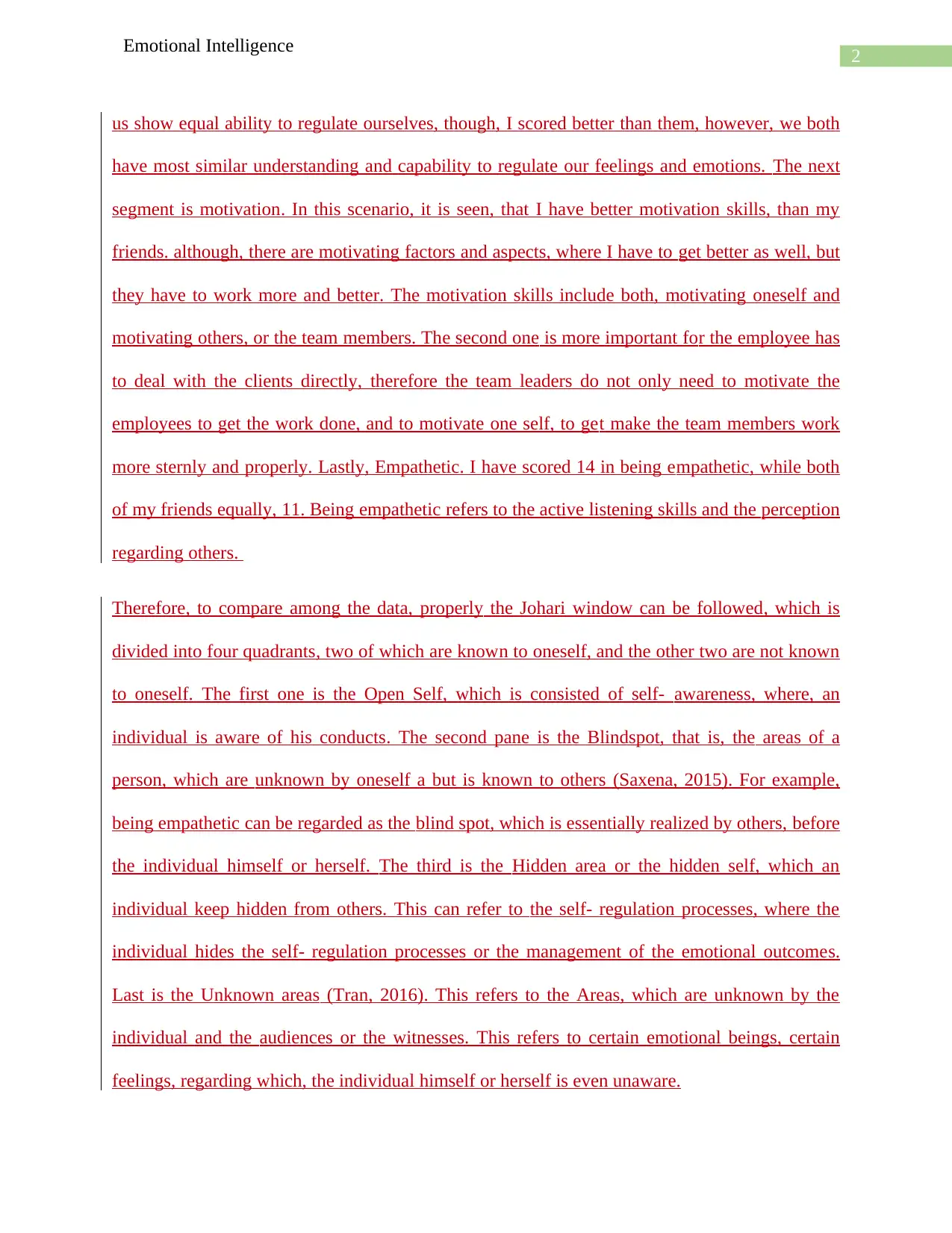
2
Emotional Intelligence
us show equal ability to regulate ourselves, though, I scored better than them, however, we both
have most similar understanding and capability to regulate our feelings and emotions. The next
segment is motivation. In this scenario, it is seen, that I have better motivation skills, than my
friends. although, there are motivating factors and aspects, where I have to get better as well, but
they have to work more and better. The motivation skills include both, motivating oneself and
motivating others, or the team members. The second one is more important for the employee has
to deal with the clients directly, therefore the team leaders do not only need to motivate the
employees to get the work done, and to motivate one self, to get make the team members work
more sternly and properly. Lastly, Empathetic. I have scored 14 in being empathetic, while both
of my friends equally, 11. Being empathetic refers to the active listening skills and the perception
regarding others.
Therefore, to compare among the data, properly the Johari window can be followed, which is
divided into four quadrants, two of which are known to oneself, and the other two are not known
to oneself. The first one is the Open Self, which is consisted of self- awareness, where, an
individual is aware of his conducts. The second pane is the Blindspot, that is, the areas of a
person, which are unknown by oneself a but is known to others (Saxena, 2015). For example,
being empathetic can be regarded as the blind spot, which is essentially realized by others, before
the individual himself or herself. The third is the Hidden area or the hidden self, which an
individual keep hidden from others. This can refer to the self- regulation processes, where the
individual hides the self- regulation processes or the management of the emotional outcomes.
Last is the Unknown areas (Tran, 2016). This refers to the Areas, which are unknown by the
individual and the audiences or the witnesses. This refers to certain emotional beings, certain
feelings, regarding which, the individual himself or herself is even unaware.
Emotional Intelligence
us show equal ability to regulate ourselves, though, I scored better than them, however, we both
have most similar understanding and capability to regulate our feelings and emotions. The next
segment is motivation. In this scenario, it is seen, that I have better motivation skills, than my
friends. although, there are motivating factors and aspects, where I have to get better as well, but
they have to work more and better. The motivation skills include both, motivating oneself and
motivating others, or the team members. The second one is more important for the employee has
to deal with the clients directly, therefore the team leaders do not only need to motivate the
employees to get the work done, and to motivate one self, to get make the team members work
more sternly and properly. Lastly, Empathetic. I have scored 14 in being empathetic, while both
of my friends equally, 11. Being empathetic refers to the active listening skills and the perception
regarding others.
Therefore, to compare among the data, properly the Johari window can be followed, which is
divided into four quadrants, two of which are known to oneself, and the other two are not known
to oneself. The first one is the Open Self, which is consisted of self- awareness, where, an
individual is aware of his conducts. The second pane is the Blindspot, that is, the areas of a
person, which are unknown by oneself a but is known to others (Saxena, 2015). For example,
being empathetic can be regarded as the blind spot, which is essentially realized by others, before
the individual himself or herself. The third is the Hidden area or the hidden self, which an
individual keep hidden from others. This can refer to the self- regulation processes, where the
individual hides the self- regulation processes or the management of the emotional outcomes.
Last is the Unknown areas (Tran, 2016). This refers to the Areas, which are unknown by the
individual and the audiences or the witnesses. This refers to certain emotional beings, certain
feelings, regarding which, the individual himself or herself is even unaware.
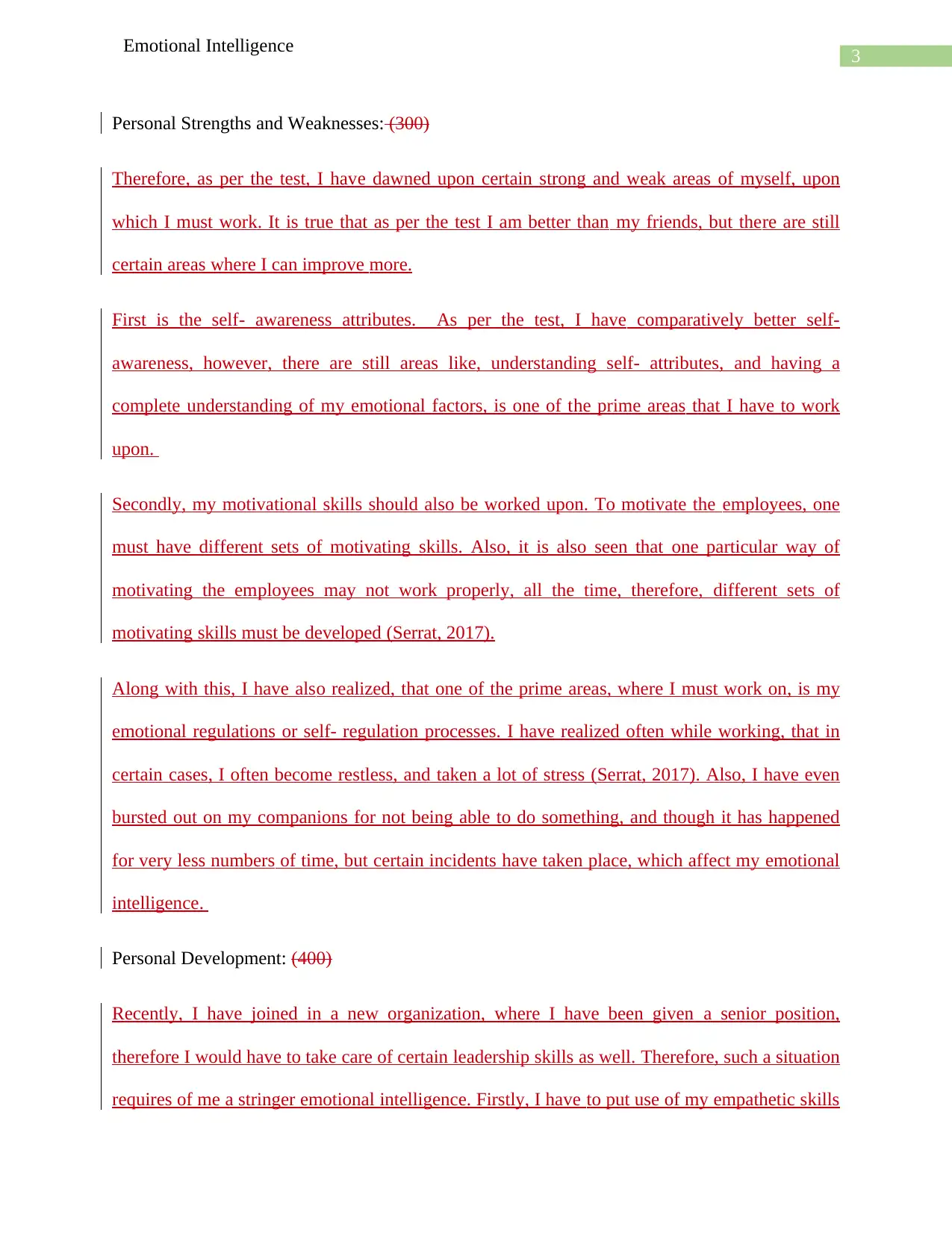
3
Emotional Intelligence
Personal Strengths and Weaknesses: (300)
Therefore, as per the test, I have dawned upon certain strong and weak areas of myself, upon
which I must work. It is true that as per the test I am better than my friends, but there are still
certain areas where I can improve more.
First is the self- awareness attributes. As per the test, I have comparatively better self-
awareness, however, there are still areas like, understanding self- attributes, and having a
complete understanding of my emotional factors, is one of the prime areas that I have to work
upon.
Secondly, my motivational skills should also be worked upon. To motivate the employees, one
must have different sets of motivating skills. Also, it is also seen that one particular way of
motivating the employees may not work properly, all the time, therefore, different sets of
motivating skills must be developed (Serrat, 2017).
Along with this, I have also realized, that one of the prime areas, where I must work on, is my
emotional regulations or self- regulation processes. I have realized often while working, that in
certain cases, I often become restless, and taken a lot of stress (Serrat, 2017). Also, I have even
bursted out on my companions for not being able to do something, and though it has happened
for very less numbers of time, but certain incidents have taken place, which affect my emotional
intelligence.
Personal Development: (400)
Recently, I have joined in a new organization, where I have been given a senior position,
therefore I would have to take care of certain leadership skills as well. Therefore, such a situation
requires of me a stringer emotional intelligence. Firstly, I have to put use of my empathetic skills
Emotional Intelligence
Personal Strengths and Weaknesses: (300)
Therefore, as per the test, I have dawned upon certain strong and weak areas of myself, upon
which I must work. It is true that as per the test I am better than my friends, but there are still
certain areas where I can improve more.
First is the self- awareness attributes. As per the test, I have comparatively better self-
awareness, however, there are still areas like, understanding self- attributes, and having a
complete understanding of my emotional factors, is one of the prime areas that I have to work
upon.
Secondly, my motivational skills should also be worked upon. To motivate the employees, one
must have different sets of motivating skills. Also, it is also seen that one particular way of
motivating the employees may not work properly, all the time, therefore, different sets of
motivating skills must be developed (Serrat, 2017).
Along with this, I have also realized, that one of the prime areas, where I must work on, is my
emotional regulations or self- regulation processes. I have realized often while working, that in
certain cases, I often become restless, and taken a lot of stress (Serrat, 2017). Also, I have even
bursted out on my companions for not being able to do something, and though it has happened
for very less numbers of time, but certain incidents have taken place, which affect my emotional
intelligence.
Personal Development: (400)
Recently, I have joined in a new organization, where I have been given a senior position,
therefore I would have to take care of certain leadership skills as well. Therefore, such a situation
requires of me a stringer emotional intelligence. Firstly, I have to put use of my empathetic skills
Secure Best Marks with AI Grader
Need help grading? Try our AI Grader for instant feedback on your assignments.
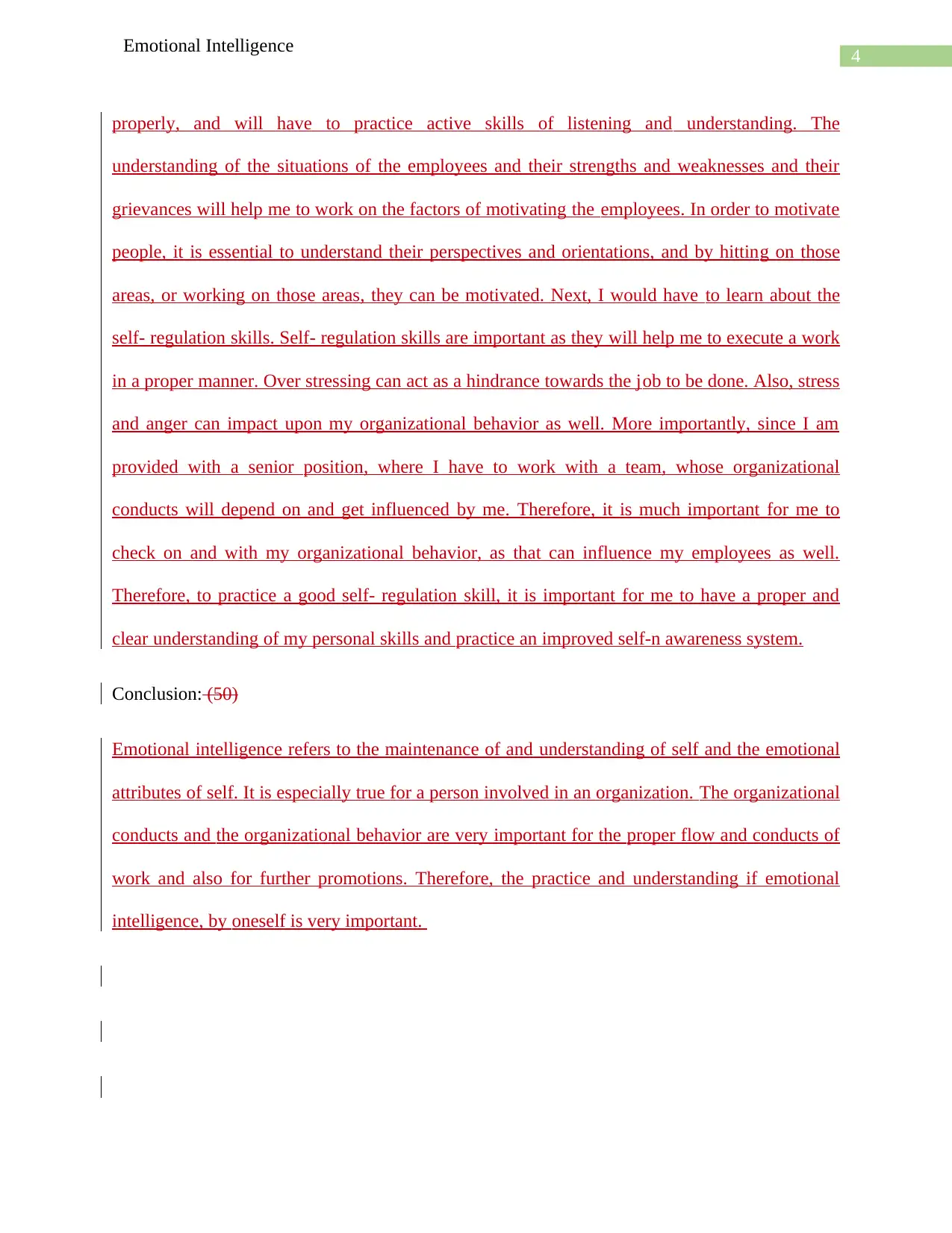
4
Emotional Intelligence
properly, and will have to practice active skills of listening and understanding. The
understanding of the situations of the employees and their strengths and weaknesses and their
grievances will help me to work on the factors of motivating the employees. In order to motivate
people, it is essential to understand their perspectives and orientations, and by hitting on those
areas, or working on those areas, they can be motivated. Next, I would have to learn about the
self- regulation skills. Self- regulation skills are important as they will help me to execute a work
in a proper manner. Over stressing can act as a hindrance towards the job to be done. Also, stress
and anger can impact upon my organizational behavior as well. More importantly, since I am
provided with a senior position, where I have to work with a team, whose organizational
conducts will depend on and get influenced by me. Therefore, it is much important for me to
check on and with my organizational behavior, as that can influence my employees as well.
Therefore, to practice a good self- regulation skill, it is important for me to have a proper and
clear understanding of my personal skills and practice an improved self-n awareness system.
Conclusion: (50)
Emotional intelligence refers to the maintenance of and understanding of self and the emotional
attributes of self. It is especially true for a person involved in an organization. The organizational
conducts and the organizational behavior are very important for the proper flow and conducts of
work and also for further promotions. Therefore, the practice and understanding if emotional
intelligence, by oneself is very important.
Emotional Intelligence
properly, and will have to practice active skills of listening and understanding. The
understanding of the situations of the employees and their strengths and weaknesses and their
grievances will help me to work on the factors of motivating the employees. In order to motivate
people, it is essential to understand their perspectives and orientations, and by hitting on those
areas, or working on those areas, they can be motivated. Next, I would have to learn about the
self- regulation skills. Self- regulation skills are important as they will help me to execute a work
in a proper manner. Over stressing can act as a hindrance towards the job to be done. Also, stress
and anger can impact upon my organizational behavior as well. More importantly, since I am
provided with a senior position, where I have to work with a team, whose organizational
conducts will depend on and get influenced by me. Therefore, it is much important for me to
check on and with my organizational behavior, as that can influence my employees as well.
Therefore, to practice a good self- regulation skill, it is important for me to have a proper and
clear understanding of my personal skills and practice an improved self-n awareness system.
Conclusion: (50)
Emotional intelligence refers to the maintenance of and understanding of self and the emotional
attributes of self. It is especially true for a person involved in an organization. The organizational
conducts and the organizational behavior are very important for the proper flow and conducts of
work and also for further promotions. Therefore, the practice and understanding if emotional
intelligence, by oneself is very important.
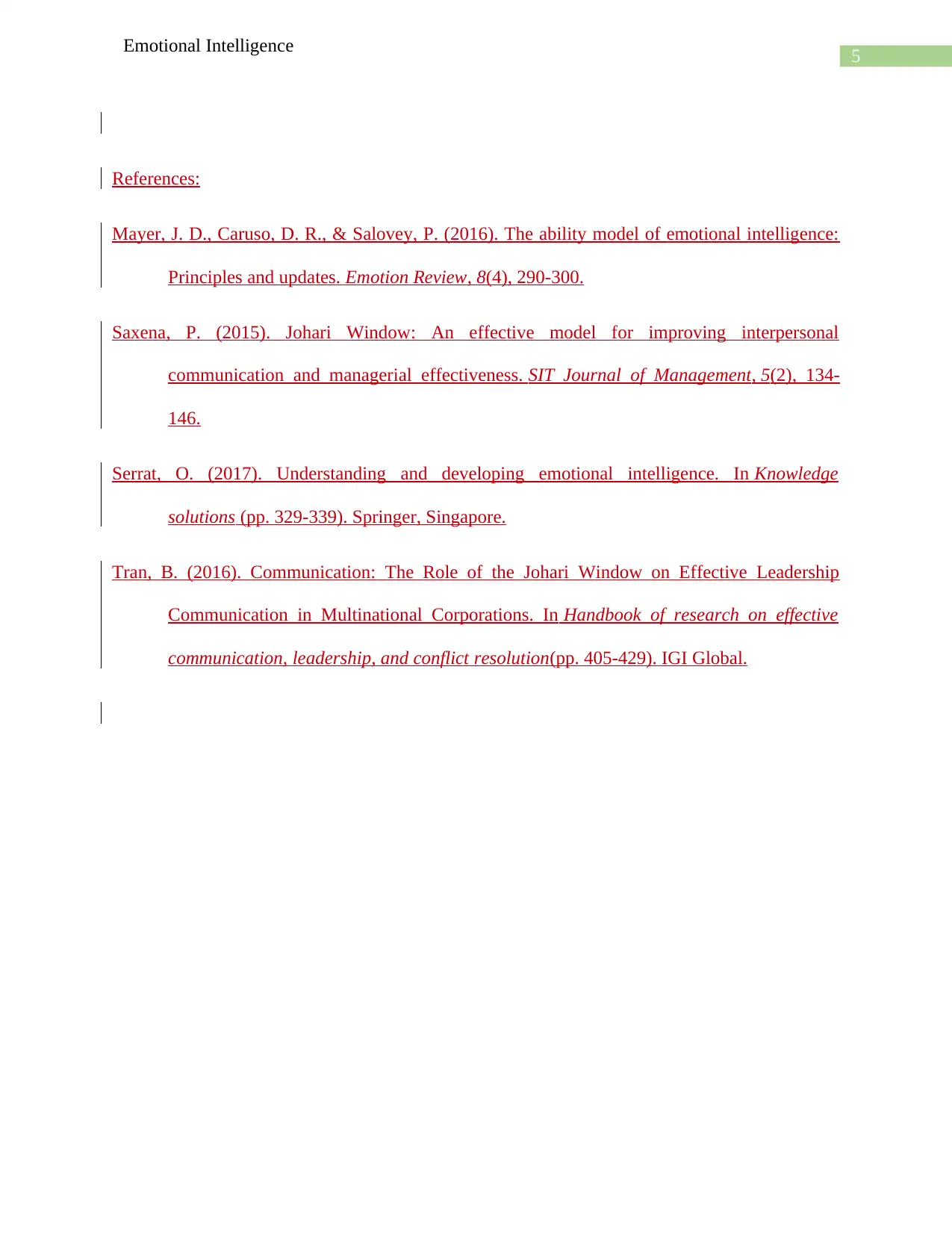
5
Emotional Intelligence
References:
Mayer, J. D., Caruso, D. R., & Salovey, P. (2016). The ability model of emotional intelligence:
Principles and updates. Emotion Review, 8(4), 290-300.
Saxena, P. (2015). Johari Window: An effective model for improving interpersonal
communication and managerial effectiveness. SIT Journal of Management, 5(2), 134-
146.
Serrat, O. (2017). Understanding and developing emotional intelligence. In Knowledge
solutions (pp. 329-339). Springer, Singapore.
Tran, B. (2016). Communication: The Role of the Johari Window on Effective Leadership
Communication in Multinational Corporations. In Handbook of research on effective
communication, leadership, and conflict resolution(pp. 405-429). IGI Global.
Emotional Intelligence
References:
Mayer, J. D., Caruso, D. R., & Salovey, P. (2016). The ability model of emotional intelligence:
Principles and updates. Emotion Review, 8(4), 290-300.
Saxena, P. (2015). Johari Window: An effective model for improving interpersonal
communication and managerial effectiveness. SIT Journal of Management, 5(2), 134-
146.
Serrat, O. (2017). Understanding and developing emotional intelligence. In Knowledge
solutions (pp. 329-339). Springer, Singapore.
Tran, B. (2016). Communication: The Role of the Johari Window on Effective Leadership
Communication in Multinational Corporations. In Handbook of research on effective
communication, leadership, and conflict resolution(pp. 405-429). IGI Global.
1 out of 6
Related Documents
Your All-in-One AI-Powered Toolkit for Academic Success.
+13062052269
info@desklib.com
Available 24*7 on WhatsApp / Email
![[object Object]](/_next/static/media/star-bottom.7253800d.svg)
Unlock your academic potential
© 2024 | Zucol Services PVT LTD | All rights reserved.





